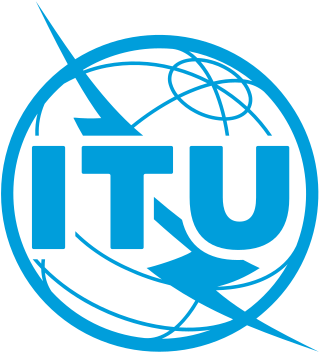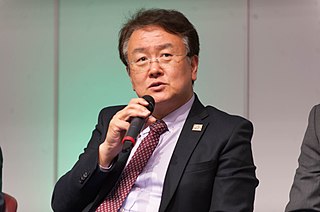Telecommunications in the Central African Republic includes radio, television, fixed and mobile telephones, and the Internet as well as the postal system.

Telecommunications in Ghana include radio, television, fixed and mobile telephones, and the Internet.
Telecommunication in Honduras started in 1876 when the first telegraph was introduced, continued development with the telephone in 1891, radio in 1928, television in 1959, the Internet in the early 1990s, and cellphones in 1996.

The International Telecommunication Union Telecommunication Standardization Sector (ITU-T) is one of the three Sectors (branches) of the International Telecommunication Union (ITU). It is responsible for coordinating standards for telecommunications and Information Communication Technology, such as X.509 for cybersecurity, Y.3172 and Y.3173 for machine learning, and H.264/MPEG-4 AVC for video compression, between its Member States, Private Sector Members, and Academia Members.

The International Telecommunication Union (ITU) is a specialized agency of the United Nations responsible for many matters related to information and communication technologies. It was established on 17 May 1865 as the International Telegraph Union, making it the oldest UN agency. Doreen Bogdan-Martin is the Secretary-General of ITU, the first woman to serve as its head.

The ITU Radiocommunication Sector (ITU-R) is one of the three sectors of the International Telecommunication Union (ITU) and is responsible for radio communications.
Telecommunications in Sudan includes fixed and mobile telephones, the Internet, radio, and television. Approximately 12 million out of 45 million people in Sudan use the Internet, mainly on smartphones and mobile computers.
Telecommunications in Eswatini includes radio, television, fixed and mobile telephones, and the Internet.

The (International) Radiotelephony Spelling Alphabet, commonly known as the NATO phonetic alphabet, is the most widely used set of clear code words for communicating the letters of the Roman alphabet. Technically a radiotelephonic spelling alphabet, it goes by various names, including NATO spelling alphabet, ICAO phonetic alphabet and ICAO spelling alphabet. The ITU phonetic alphabet and figure code is a rarely used variant that differs in the code words for digits.

The European Telecommunications Satellite Organization is an intergovernmental organisation consisting of 49 member states. It is headquartered in Paris, France. The mission of EUTELSAT IGO is to maintain the rights to use radio frequencies and orbital locations which were assigned collectively to the Member States by the International Telecommunication Union (ITU) and to oversee the operations of Eutelsat S.A. so as to ensure that the company complies with the international EUTELSAT Convention. EUTELSAT IGO plays an active role within the global telecommunications community and is a key actor in the satellite business sector.

Spectrum management is the process of regulating the use of radio frequencies to promote efficient use and gain a net social benefit. The term radio spectrum typically refers to the full frequency range from 1 Hz to 3000 GHz that may be used for wireless communication. Increasing demand for services such as mobile telephones and many others has required changes in the philosophy of spectrum management. Demand for wireless broadband has soared due to technological innovation, such as 3G and 4G mobile services, and the rapid expansion of wireless internet services.
The Internet in Botswana is used by about 28.4% of the population. This is slightly lower than the figure of 28.6% for Africa as a whole in 2015.

Malcolm Johnson is a British civil servant. He is the Deputy Secretary-General of the ITU and former Director of the Telecommunication Standardization Bureau (TSB) of the ITU Standardization Sector (ITU-T). He was elected Director by the ITU Plenipotentiary Conference, 2006 in Antalya, Turkey. He took office on 1 January 2007 and was re-elected at the ITU Plenipotentiary Conference 2010. At the ITU Plenipotentiary Conference 2014 in Busan, he was elected to a term as Deputy Secretary-General, and at the 2018 ITU Plenipotentiary Conference in Dubai, he was reelected to a second term.
Global Internet Usage is the number of people who use the Internet worldwide.

Houlin Zhao is a Chinese engineer who served as the Secretary-General of the International Telecommunication Union (ITU) from 2015 to 2022. He was first elected at the 2014 Plenipotentiary Conference in Busan, and re-elected at the 2018 Plenipotentiary Conference in Dubai. ITU is the specialized United Nations Agency for Information and Communication Technology (ICT), working on promotion, collaboration, and standardization.

Doreen Bogdan-Martin is an American diplomat and engineer, current Secretary-General of the International Telecommunication Union. She was elected at the 2022 ITU Plenipotentiary Conference in Bucharest, and as the first woman in the 157-year history of the ITU to become the Secretary-General. Previously, she was the first woman to become an Elected Official of the ITU, as the Director of the Telecommunication Development Bureau of the ITU.

Chaesub Lee PhD is a telecommunication executive who served as the Director of ITU Telecommunication Standardization Bureau, the permanent secretariat of the International Telecommunication Union Telecommunication Standardization Sector (ITU-T) from 2015 until 2022.

The ITU-T Study Group 17 (SG17) is a statutory group of the ITU Telecommunication Standardization Sector (ITU-T) concerned with security. The group is concerned with a broad range of security-related standardization issues such as cybersecurity, security management, security architectures and frameworks, countering spam, identity management, biometrics, protection of personally identifiable information, and the security of applications and services for the Internet of Things (IoT). It is responsible for standardization of i.a. ASN.1 and X.509, it is also the parent body of the Focus Group on Quantum Information Technology (FG-QIT). The group is currently chaired by Heung Youl Youm of South Korea.
Seizo Onoe, a Japanese telecommunication executive, is the Director of the Telecommunication Standardization Bureau of the International Telecommunication Union, the Secretariat of ITU-T. Onoe was elected to the post of Director of the TSB for the term 2023-2026 at the ITU Plenipotentiary Conference 2022 (PP-22).










